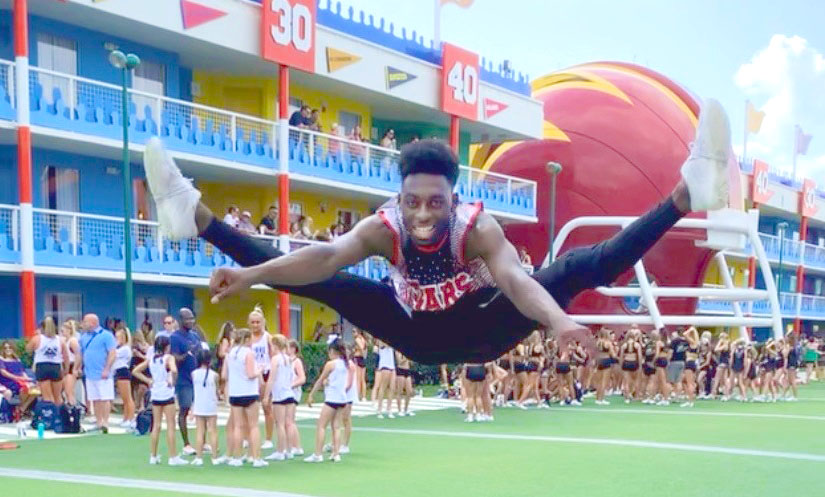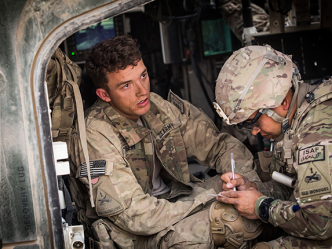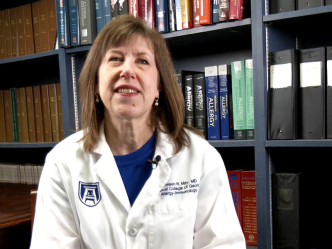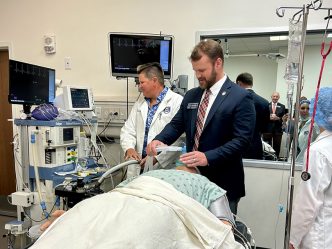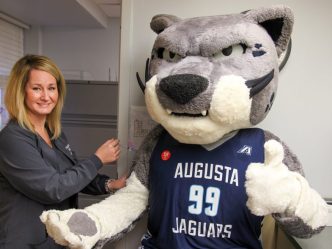One year ago, Augusta resident Jalen Scales, a star high school cheerleader for Cross Creek High School and six-year veteran of the Augusta Cheer Academy, was heading to his car when suddenly he felt his knee “pop” in the parking lot.
“It kind of hurt but I didn’t say anything,” he said.
Scales recalled that he had been doing some flips in practice earlier in the day and had a bit of a rough landing that hurt as well.
Even so, having had knee surgery the year before, he was hesitant to bring it up to anyone else, to avoid having to go through another surgery.
His knee continued to hurt until the following day at school, when the knee “popped” again. He would later learn that at this point, his kneecap had shattered and the bones were floating around inside.
When he returned home, he finally told his mother, Trameka Nails, who had him checked out at Augusta University Health. They met with Dr. Monte Hunter, chair of the Department of Orthopaedic Surgery at Augusta University’s Medical College of Georgia, who had performed the first surgery, which involved drilling a hole in the ligament in hopes that it would heal. After noticing the broken bone and torn cartilage, Hunter referred them to fellow orthopedic surgeon and MCG assistant professor Dr. Robert Willson.
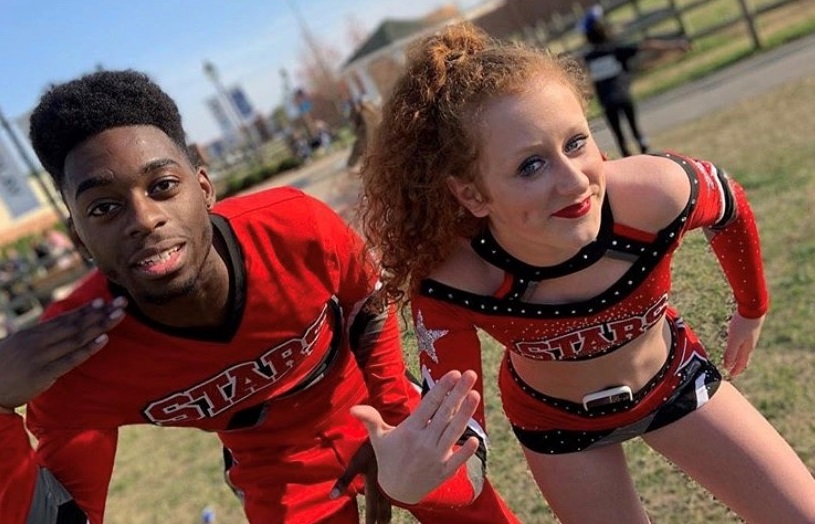
“The procedure I recommended is reserved exclusively for focal-cartilage defects, which is not a huge subset of the population,” said Willson. “There are a couple of surgeries we can do to get past that.”
Willson diagnosed Scales with osteochondritis dissecans, in which a portion of cartilage loses blood supply.
This cartilage transplant is selectively done, and AU Health only performs one or two cartilage procedures a month.
“I’ve had a couple of patients with very large bone and cartilage problems,” Willson said. “One had avascular necrosis [another disorder in which blood supply to the bone is lost] that knocked out a very significant portion of the outside of her knee. The first time I saw her in clinic, she was in a wheelchair not going to school. We were able to get the knee fixed, and now when I see her in clinic, she is able to walk on her own power and do a lot of things that she wasn’t able to do before.”
Scales was worried that he might not be able to walk again, much less continue cheerleading, which has a lot of high impact on his knee. Due to the injury, he was unable to cheer for the school or in competitions with the Augusta Cheer Academy.
“I was really concerned,” said his mother. “He’s a competitive cheerleader, a sport that he has loved. I was wondering if he could do that anymore. There were a lot of concerns on my part about his knee being injured. I knew how disappointed he was after the first surgery.”
But the cartilage transplant gave them hope.
“They were going to go in and take out all of the floating fragments,” said Nails. “Dr. Willson was going to put an incision in the middle of my son’s knee. There would be a growth, the bone would be infused with his bone and he would hopefully go back to being a competitor and cheerleader and have complete mobility.”
As Willson described it, they send an MRI of the patient to a tissue bank, where “they age and size-match a ‘fresh allograft’ from someone recently deceased. Once there is a match, I am notified, and I can accept or decline the graft. It’s then over-nighted and we have one week to put it in.”
Scales went under the knife in July of last year, and then needed six weeks to recover.
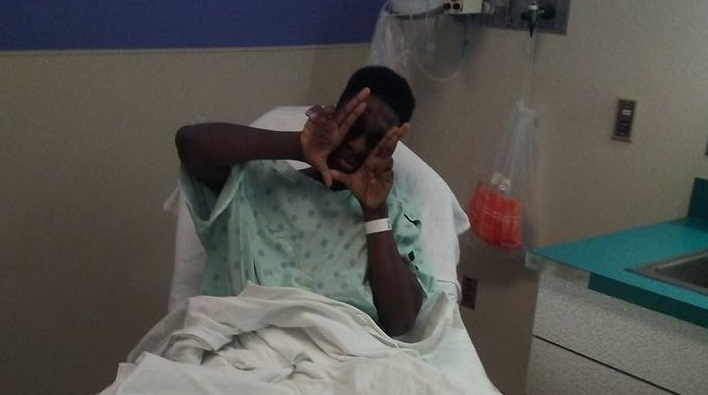
“Once I got the surgery, I was happy,” he said. “It wasn’t as bad as I thought it was going to be. The first two or three weeks were hard due to the pain but later, the pain wasn’t so bad. I could walk around and bend my knees.”
After he healed and some time had passed, he called his coach at Augusta Cheer Academy.
“I felt like I let them down and I didn’t want to go back at first,” he said. But after some thought, he decided to return.
“Some people were shocked when I came back. I watched some practices, and slowly got back into the team. Everybody was happy, saying, ‘We needed you back.’”
With full mobility again and feeling better than ever, Scales soon picked up right where he left off, in competitions and supporting Cross Creek High School.
“Jalen being able to cheer again is a big relief for me,” said Nails. She was thrilled to see him competing and was recently approached by someone offering to try to help Scales get a cheerleading scholarship.
“It’s kind of life-changing if he can get a scholarship,” she said.
Now at age 17, this experience has also helped Scales decide what he wants to do beyond cheering.
“I want to be a physical therapist,” he said, a decision that has made his mother very happy as well.
Now heading into his junior year, it looks like the sky is the limit for Scales, quite literally. Just a few weeks ago, his Augusta Cheer Academy team placed fifth in the nation at the D2 Summit competition in Orlando, Florida. Scales will soon start training for the National Cheerleaders Association All-Star Nationals in Dallas early next year.
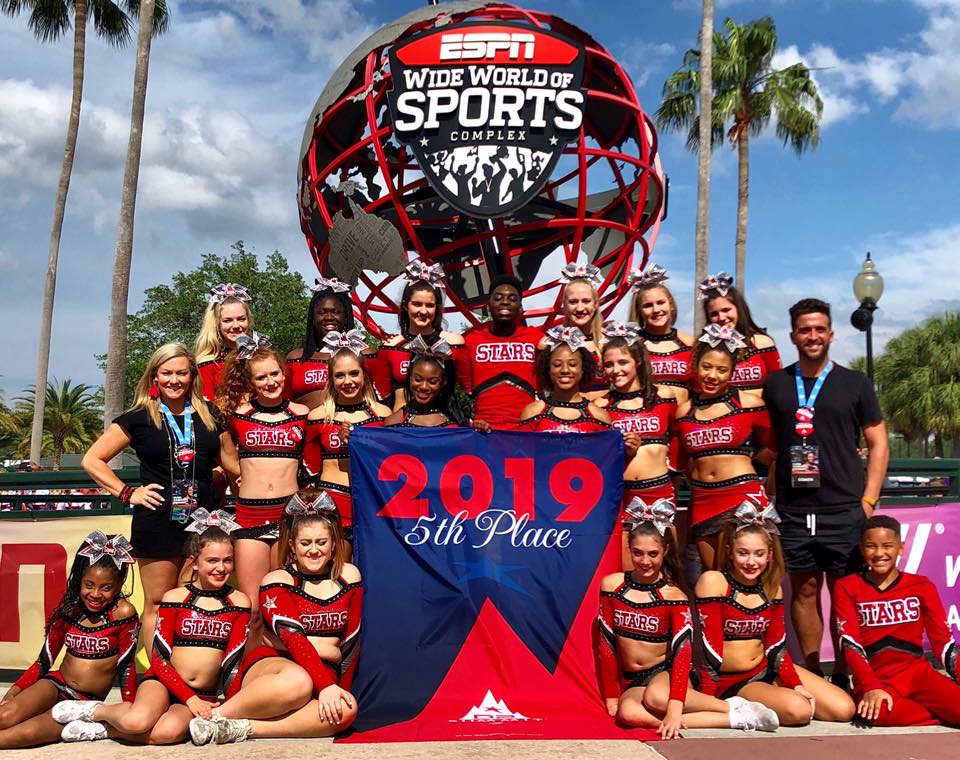
“I would 100 percent attribute all of this to the surgery,” said Scales. “Had Dr. Willson not introduced us to the procedure and told us about it, I don’t know what we would have done. It was a huge win.”
 Augusta University
Augusta University
